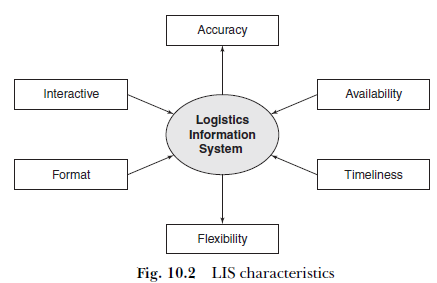The need for information support of an organization, for planning and implementing logistics decisions, depends on the objectives. The quality of management decisions in logistics will depend on the quality of the information generated by the LIS. The criticality of a decision will determine the speed and accuracy needs of the desired information. However, to reduce the risk involved in decisionmaking, the following features are required to be considered while designing the LIS (see Figure 10.2).

Accuracy. Increased accuracy in measuring inventory level reduces decision uncertainty. Accuracy with regard to inventory can be defined as the degree to which the information generated through the reports matches with that of the physical counts. Ideally, an inventory, counted physically, should match the one reflected in the LIS report. If there is a deviation, it is necessary to maintain a buffer stock to take care of the deviation. A high degree of accuracy always helps minimize the risk element in making a decision.
Availability. Operating-level data is frequently required to prepare status reports in different formats for various management levels in an organization. This information should be readily available and retrievable. For example, if a customer wants to know the status of his order, or the management wants information on current inventory levels to make a commitment to some large client of strategic importance, LIS should be designed to respond to such queries immediately, as these are based on operating-level information.
Timeliness. The addition or subtraction of information should be on a real-time basis. For example, the delays in customer order registration and order processing will give an incorrect picture of ‘orders on hand’. The procurement actions initiated on the basis of an incorrect report will create material shortages in future, particularly for long delivery parts. In another case, the material allocations based on old report may create problems in providing services to the important customer. Updates on information for additions or deletion should be taken care of before the periodic reports are due for generation. Cut-off dates for updates may be fixed daily, weekly or monthly, depending on the periodicity of report generation.
Flexibility. Flexibility refers to information requirements in the formats needed by the internal users and the external customers of an organization. Internal users may require information in one particular format, while the customer who places a very large order for a greenfield project requires order status reports periodically in different formats to forward to his bankers, top management, government and so forth. The LIS should be designed for such flexibility.
Format. In an organization, decisions are taken at various levels. The degree of criticality, frequency and impact varies with the authority level making the decision. Obviously, the format in
which the information is required differs with the authority making the decision. LIS should be designed to satisfy the information needs of system users in the format of their choice.
At the top management level, a half-page status report on inventory level is sufficient to decide on the funds requirement; while the materials manager will call for a status report on A-class items, leaving the decision for B-class items to his subordinates.
Interactive. It is not practically possible for human beings to predict all deviations, particularly when operating-level activities are voluminous. If the safety or reorder levels of the inventory dangerously deviate from the norms, LIS should bring this to the notice of the system users by way of generating an exceptional status report. Any deviation, especially in the case of large orders from strategic clients, should be highlighted to the concerned users. The exceptional reports help managers to focus on the critical areas of deviations to take timely corrective actions. Hence, for the large organizations especially, there is a real need of LIS, which highlights exceptional situations that are sometimes not noticed by executives who are too busy making decisions on the reports generated regularly. The expert systems or the information systems based on artificial intelligence help the management to look for solutions to the problems that were earlier encountered and resolved by the experts.
Source: Sople V.V (2013), Logistics Management, Pearson Education India; Third edition.

superb post.Ne’er knew this, thanks for letting me know.
Some genuinely interesting details you have written.Helped me a lot, just what I was looking for : D.